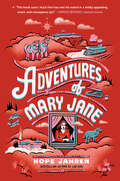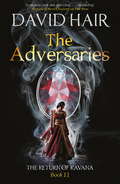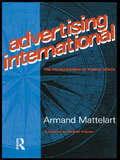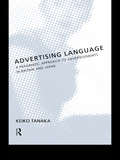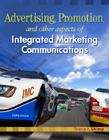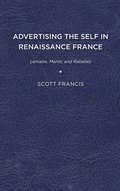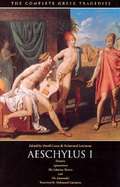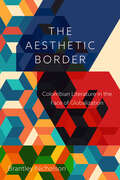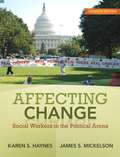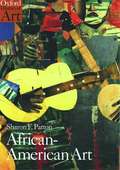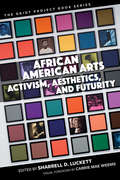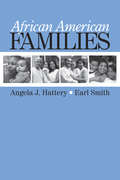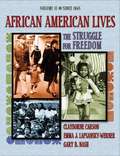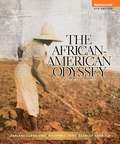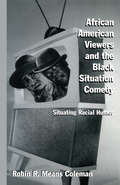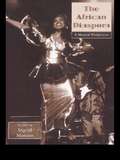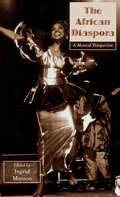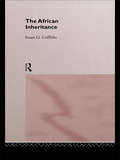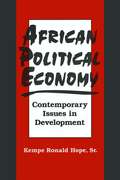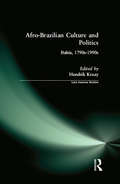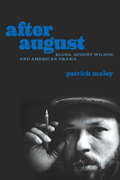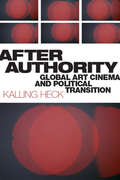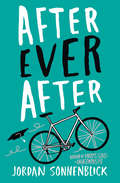- Table View
- List View
Adventures of Mary Jane
by Hope JahrenIn this brand new reimagining, Mary Jane—the red-headed spark from Mark Twain's Adventures of Huckleberry Finn, who stole Huck's heart in just 30 pages—comes to life with her own story of adventuring down the Mississippi River in the 1840s.Meet Mary Jane Guild — she&’s on a dangerous and unpredictable adventure down the Mississippi River — and she&’ll steal Huck Finn&’s heart along the way.In his classic work Adventures of Huckleberry Finn, Mark Twain briefly introduces "Mary Jane, the red-headed one." In no time Mary Jane becomes the girl Huck thinks about "a many and a many million times." Now author Hope Jahren has created for Mary Jane a life as vivid and compelling as Huck's.These pages will show you the real Mary Jane. A girl on her own dangerous, unpredictable journey down the Mississippi River in pre-Civil War America. Equipped with an uncanny ability for mathematics, a talent for sewing, and a bale of beaver skins, Mary Jane navigates deadly illnesses, angry mobs, treacherous landowners, outright thieves and swindlers, and more than a thousand miles of muddy water. What&’s more, she thrives in the face of these challenges, thanks to support from strangers who become friends. Traveling solo requires Mary Jane to grow up fast, but it ultimately leads her to a new resilience, a love of adventure, deep and enduring sisterhood, and a blue-eyed, ponytailed boy she can&’t stop thinking about.Jahren offers a wealth of layered characters and deeply researched, authentic details of changing times in the North and South. Using the language and style of Twain and shifting the point of view to a smart and determined young woman, she explores timeless themes of duty, family, romance, and betrayal, with grit and courage at the core.
Adventures of Perception: Essays / Interviews
by Scott MacdonaldIn this collection of thematically related personal essays and conversations with filmmakers, the author takes us on a fascinating journey into many under-explored territories of cinema.
The Adversaries: The Return of Ravana Book 2 (The\return Of Ravana Ser. #2)
by David Hair'Genuinely dark and unsettling . . . The story-telling within the novel is outstanding' - The Historical Novel Society on The Pyre, book 1 of the Return of Ravana. A thrilling timeslip historical fantasy from award-winning author David Hair.Mumbai, 2010Everyone's talking about Swayamvara Live! This brand-new TV reality show is recreating the ages-old custom where young men compete for the hand of a noble bride. In this case, the bride is Bollywood stunner Sunita Ashoka, who is pledged to marry the man who wins the on-screen contest. For Vikram Khandavani, it's a chance to draw out his nemesis Ravindra, the reincarnated sorcerer-king - but he's taking a deadly gamble.Delhi, 1175 King Prithviraj Chauhan is about to storm the swayamvara of the beautiful Sanyogita - but he's not the only one fixated on the bride-to-be: Ravindra-Raj is coming too, and he's riding at the side of a fierce invader. Only Chand Bardai, in another life known as Aram Dhoop, the Poet of Mandore, stands between Ravindra and all the thrones of India.The Adversaries is the sequel to The Pyre and the second book in award-winning author David Hair's Return of Ravana series.
Advertising and Integrated Brand Promotion
by Richard J. Semenik Angeline Close Scheinbaum Chris T. Allen Thomas Clayton O'GuinnToday's most contemporary ads and exhibits combine with coverage of the latest practices and industry developments, including social media, design thinking, and an emphasis on globalization. The book's focus on real advertising practice is reflected in the book's contents that follows the same process as an advertising agency. Trust ADVERTISING AND INTEGRATED BRAND PROMOTION, 7E to equip you with the tools, knowledge, and practice to get results in advertising and business today.
Advertising International: The Privatisation of Public Space (Comedia)
by Armand MattelartFirst published in 1991. Routledge is an imprint of Taylor & Francis, an informa company.
Advertising Language: A Pragmatic Approach to Advertisements in Britain and Japan
by Keiko TanakaKeiko Tanaka offers an analysis of the linguistic devices that are used in advertisements, looking at the strategems which advertisers employ to gain and retain the attention of their audience. Using relevance theory as a framework, she sets out its key aspects and applies them to the language of written advertising in Britain and Japan. Particular emphasis is placed on `covert communication', puns and metaphors, and the book contains a unique chapter on images of women in Japanese advertising. It is fully illustrated throughout with recent contrasting advertisements drawn from the two countries. The book provides a compelling analysis of the language of advertising, and an exploration of Relevance Theory that will be of interest to scholars in many fields.
Advertising Promotion and Other Aspects of Integrated Marketing Communications
by Terence A. ShimpThe eighth edition of Shimp's market-leading Advertising, Promotion, And Other Aspects Of Integrated Marketing Communications fully integrates all aspects of marketing communication. While continuing to focus on the time honored IMC methods, the text reflects new academic literature and practitioner developments in the field.
Advertising the Self in Renaissance France: Lemaire, Marot, and Rabelais (Early Modern Exchange)
by Scott FrancisAdvertising the Self in Renaissance France explores how authors and readers are represented in printed editions of three major literary figures: Jean Lemaire de Belges, Clément Marot, and François Rabelais. Print culture is marked by an anxiety of reception that became much more pronounced with increasingly anonymous and unpredictable readerships in the sixteenth century. To allay this anxiety, authors, as well as editors and printers, turned to self-fashioning in order to sell not only their books but also particular ways of reading. They advertised correct modes of reading as transformative experiences offered by selfless authors that would help the actual reader attain the image of the ideal reader held up by the text and paratext. Thus, authorial personae were constructed around the self-fashioning offered to readers, creating an interdependent relationship that anticipated modern advertising.Distributed for the University of Delaware Press
Aeschylus I: Agamemnon, The Libation Bearers, The Eumenides (The Complete Greek Tragedies #1)
by Aeschylus David Grene Richmond Lattimore"These authoritative translations consign all other complete collections to the wastebasket."--Robert Brustein, The New Republic. "This is it. No qualifications. Go out and buy it everybody."--Kenneth Rexroth, The Nation. "The translations deliberately avoid the highly wrought and affectedly poetic; their idiom is contemporary.... They have life and speed and suppleness of phrase."--Times Education Supplement. "These translations belong to our time. A keen poetic sensibility repeatedly quickens them; and without this inner fire the most academically flawless rendering is dead."--Warren D. Anderson, American Oxonian. "The critical commentaries and the versions themselves... are fresh, unpretentious, above all, functional."--Commonwealth. "Grene is one of the great translators."--Conor Cruise O'Brien, London Sunday Times. "Richmond Lattimore is that rara avis in our age, the classical scholar who is at the same time an accomplished poet."--Dudley Fitts, New York Times Book Review.
The Aesthetic Border: Colombian Literature in the Face of Globalization (Bucknell Studies in Latin American Literature and Theory)
by Brantley NicholsonThis groundbreaking study examines how modern Colombian literature—from Gabriel García Márquez to Juan Gabriel Vásquez—reflects one of the world’s most tumultuous entrances into globalization. While these literary icons, one canonical, the other emergent, bookend Colombia’s fall and rise on the world stage, the period between the two was inordinately violent, spanning the Colombian urban novel’s evolution into narco-literature. Marking Colombia’s cultural and literary manifestations as threefold, this book explores García Márquez’s retreat to a rural romanticism that paradoxically made him a global literary icon; the country’s violent end to the twentieth century when its largest economic export was narcotics; and the contemporary period in which a new major author has emerged to create a “literature of national reconstitution.” Harkening back to the Regeneration movement and extending through the early twenty-first century, this book analyzes the cultural implications of Colombia’s relationship to the wider world.
Affecting Change: Social Workers in the Political Arena
by Karen S. Haynes James S. MickelsonUpdated to reflect advances in a changing political arena of Obama's administration, this revision shows students how to develop political action skills and to take advantage of the opportunity of change. This practical, step-by-step guide focuses on advocacy as the central mission of social work practice. New material and 17 new personal scenarios involving social workers who have made a difference-senators, representatives, and officials in the political arena-serve to inspire students. Revised chapters show how social work skills can be most effective, whether by impacting the political arena as a social worker or running for office.
African-American Art
by Sharon F. PattonFrom its origins in early 18th century slave communities to the end of the 20th century, African-American art has made a vital contribution to the art of the United States. This book provides a major reassessment of the subject, setting the art in the context of the African-American experience.
African American Arts: Activism, Aesthetics, and Futurity (The Griot Project Book Series)
by Sharrell D. Luckett Carmen Gillespie Rikki Byrd Amber Lauren Johnson Doria E. Charlson Florencia V. Cornet Daniel McNeil Lucy Caplan Genevieve Hyacinthe Sammantha McCalla Nettrice R. Gaskins Abby Dobson J. Michael Kinsey Shondrika Moss-Bouldin Julie B. Johnson Jasmine Eileen Coles Tawnya Pettiford-Wates Rickerby HindsSignaling such recent activist and aesthetic concepts in the work of Kara Walker, Childish Gambino, BLM, Janelle Monáe, and Kendrick Lamar, and marking the exit of the Obama Administration and the opening of the National Museum of African American History and Culture, this anthology explores the role of African American arts in shaping the future, and further informing new directions we might take in honoring and protecting the success of African Americans in the U.S. The essays in African American Arts: Activism, Aesthetics, and Futurity engage readers in critical conversations by activists, scholars, and artists reflecting on national and transnational legacies of African American activism as an element of artistic practice, particularly as they concern artistic expression and race relations, and the intersections of creative processes with economic, sociological, and psychological inequalities. Scholars from the fields of communication, theater, queer studies, media studies, performance studies, dance, visual arts, and fashion design, to name a few, collectively ask: What are the connections between African American arts, the work of social justice, and creative processes? If we conceive the arts as critical to the legacy of Black activism in the United States, how can we use that construct to inform our understanding of the complicated intersections of African American activism and aesthetics? How might we as scholars and creative thinkers further employ the arts to envision and shape a verdant society? Contributors: Carrie Mae Weems, Carmen Gillespie, Rikki Byrd, Amber Lauren Johnson, Doria E. Charlson, Florencia V. Cornet, Daniel McNeil, Lucy Caplan, Genevieve Hyacinthe, Sammantha McCalla, Nettrice R. Gaskins, Abby Dobson, J. Michael Kinsey, Shondrika Moss-Bouldin, Julie B. Johnson, Sharrell D. Luckett, Jasmine Eileen Coles, Tawnya Pettiford-Wates, Rickerby Hinds. Published by Bucknell University Press. Distributed worldwide by Rutgers University Press.
African American Families
by Dr Angela J. Hattery Dr Earl Smith"Bravo to the authors! They have done an excellent job addressing the issues that are critical to community members, policy makers and interventionists concerned with Black families in the context of our nation."—Michael C. Lambert, University of Missouri, Colombia"African American Families is a timely work. The strength of this text lies in the depth of coverage, clarity, and the ability to combine secondary sources, statistics and qualitative data to reveal the plight of African Americans in society."—Edward Opoku-Dapaah, Winston-Salem State University"African American Families is both engaging and challenging and is perhaps one of the most important works I have read in many years. This book will most certainly move the discourse of the socio-economic conditions of black families forward, beyond the boundaries already set by other books in the market. African American Families is an excellent book whose time has come, and one that I would most definitely adopt." —Lateef O. Badru, University of LouisvilleAfrican American Families provides a systematic sociological study of contemporary life for families of African descent living in the United States. Analyzing both quantitative and qualitative data, authors Angela J. Hattery and Earl Smith identify the structural barriers that African Americans face in their attempts to raise their children and create loving, healthy, and raise the children of the next generation.Key Features:Uses the lens provided by the race, class, and gender paradigm: Examples illustrate the ways in which multiple systems of oppression interact with patterns of self-defeating behavior to create barriers that deny many African Americans access to the American dream.Addresses issues not fully or adequately addressed in previous books on Black families: These issues include personal responsibility and disproportionately high rates of incarceration, family violence, and chronic illnesses like HIV/AIDS. Brings statistical data to life: The authors weave personal stories based on interviews they've conducted into the usual data from scholarly(?) literature and from U.S. Census Bureau reports.Provides several illustrations from Hurricane Katrina: A contemporary analysis of a recent disaster demonstrates many of the issues presented in the book such as housing segregation and predatory lending practices.Offers extensive data tables in the appendices: Assembled in easy-to-read tables, students are given access to the latest national agencies data from agencies including the U.S. Census Bureau, Centers for Disease Control, and Bureau of Justice Statistics.Intended Audience:This is an ideal textbook for advanced undergraduate and graduate courses such as African American Families, Sociology of the Family, Contemporary Families, and Race and Ethnicity in the departments of Human Development and Family Studies, Sociology, African American Studies, and Black Studies.
African American Lives: The Struggle for Freedom Volume II
by Clayborne Carson Emma J. Lapsansky-Werner Gary B. Nash'African American Lives, American History' uses a biographical approach to present African Americans as active and thoughtful agents in the construction of their lives and communities. Each chapter opens with a vignette focusing on an individual involved in a dramatic moment or event. Personal stories are told throughout the narrative.
The African-American Odyssey
by Darlene Clark Hine William C. Hine Stanley C. HarroldA compelling story of agency, survival, struggle and triumph over adversity More than any other text, The African-American Odyssey illuminates the central place of African-Americans in U. S. history by telling the story of what it has meant to be black in America and how African-American history is inseparably woven into the greater context of American history. From Africa to the 21st century, this book follows the long and turbulent journey of African-Americans, the rich culture they have nurtured throughout their history and the quest for freedom through which African-Americans have sought to counter oppression and racism. This text also recognizes the diversity within the African-American sphere, providing coverage of class and gender and balancing the lives of ordinary men and women with accounts of black leaders and the impact each has had on the struggle for freedom.
African American Viewers and the Black Situation Comedy: Situating Racial Humor (Studies in African American History and Culture)
by Robin R. Means ColemanProviding new insight into key debates over race and representation in the media, this ethnographic study explores the ways in which African Americans have been depicted in Black situation comedies-from 1950's Beulah to contemporary series like Martin and Living Single.
African Diaspora: A Musical Perspective (Critical and Cultural Musicology)
by Ingrid MonsonThe African Diaspora presents musical case studies from various regions of the African diaspora, including Africa, the Caribbean, Latin America, and Europe, that engage with broader interdisciplinary discussions about race, gender, politics, nationalism, and music.
The African Diaspora: A Musical Perspective (Critical and Cultural Musicology)
by Ingrid MonsonThe African Diaspora presents musical case studies from various regions of the African diaspora, including Africa, the Caribbean, Latin America, North America, and Europe, that engage with broader interdisciplinary discussions about race, gender, politics, nationalism, and music. Featured here are jazz, wassoulou music, and popular and traditional musics of the Caribbean and Africa, framed with attention to the reciprocal relationships of the local and the global.
The African Inheritance
by Ieuan Ll. GriffithsAfrica is a continent gripped by civil wars and widespread famine. The causes of many of the continent's problems are deep rooted and can be traced to Africa's colonial past, when European powers divided the spoils of the continent into separate sovereign states. The African Inheritance examines the effect this "balkanization" of Africa has had, and is having, on the political and economic well-being of the continent. From a brief history of pre-colonial Africa and its subsequent European partition and inevitable decolonization, the book discusses the consequences of such an inheritance: small and weak states, destructive secessionist movements, irredentism and African imperialism. Attempts to tackle these problems and assert independent development are inhibited by the colonial inheritance.
African Political Economy: Contemporary Issues in Development
by Kempe Ronald Sr.This is a multidisciplinary book that analyses the problems and issues of development in Africa along with the attempts at, and outcomes of, policy reform measures that have been implemented to surmount those problems. Topics covered include the economic crisis in Africa, urbanisation and urban management, uneven development, the socio-economic context of AIDS, bureaucratic corruption and reform, and proposed development solutions.
Afro-Brazilian Culture and Politics: Bahia, 1790s-1990s (Latin American Realities Ser.)
by Hendrik KraayThe essays in this book constitute an analytic survey of the last two centuries of Afro-Bahian history, with a focus squarely on the difficult relationship between Afro- and Euro-Bahia and on the continual Afro-Bahian struggle to create a meaningful culture in an environment either hostile or suffocating in its ability to absorb elements of Afro-Bahian culture.
After August: Blues, August Wilson, and American Drama
by Patrick MaleyCritics have long suggested that August Wilson, who called blues "the best literature we have as black Americans," appropriated blues music for his plays. After August insists instead that Wilson’s work is direct blues expression. Patrick Maley argues that Wilson was not a dramatist importing blues music into his plays; he was a bluesman, expressing a blues ethos through drama.Reading Wilson’s American Century Cycle alongside the cultural history of blues music, as well as Wilson’s less discussed work—his interviews, the polemic speech "The Ground on Which I Stand," and his memoir play How I Learned What I Learned—Maley shows how Wilson’s plays deploy the blues technique of call-and-response, attempting to initiate a dialogue with his audience about how to be black in America. After August further contends that understanding Wilson as a bluesman demands a reinvestigation of his forebears and successors in American drama, many of whom echo his deep investment in social identity crafting. Wilson’s dramaturgical pursuit of culturally sustainable black identity sheds light on Tennessee Williams’s exploration of oppressive limits on masculine sexuality and Eugene O’Neill’s treatment of psychologically corrosive whiteness. Today, the contemporary African American playwrights Katori Hall and Tarell Alvin McCraney repeat and revise Wilson’s methods, exploring the fraught and fertile terrain of racial, gender, and sexual identity. After August makes a significant contribution to the scholarship on Wilson and his undeniable impact on American drama.
After Authority: Global Art Cinema and Political Transition
by Kalling HeckAfter Authority explores the tendency in art cinema to respond to political transition by turning to ambiguity, a system that ideally stems the reemergence of authoritarian logics in art and elsewhere. By comparing films from Italy, Hungary, South Korea, and the United States, this book contends that the aesthetic tradition of ambiguity in art cinema can be traced to post-authoritarian conditions and that it is in the context of a transition away from authoritarianism where art cinema aesthetics become legible. Art cinema, then, can be seen as a mode of cinematic practice that is at its core political, as its constitutive ambiguity finds its roots in the rejection of centralized and hierarchical configurations of authority. Ultimately, After Authority proposes a history of art cinema predicated on the potentials, possibilities, and politics of ambiguity.
After Ever After
by Jordan SonnenblickJeffrey isn't a little boy with cancer anymore. He's a teen who's in remission, but life still feels fragile. The aftereffects of treatment have left Jeffrey with an inability to be a great student or to walk without limping. His parents still worry about him. His older brother, Steven, lost it and took off to Africa to be in a drumming circle and "find himself." Jeffrey has a little soul searching to do, too, which begins with his escalating anger at Steven, an old friend who is keeping something secret, and a girl who is way out of his league but who thinks he's cute.
